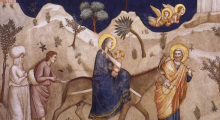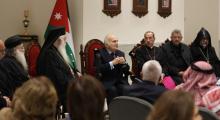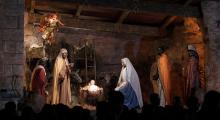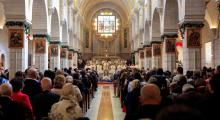Issued by the Catholic Center for Studies and Media - Jordan. Editor-in-chief Fr. Rif'at Bader - موقع أبونا abouna.org
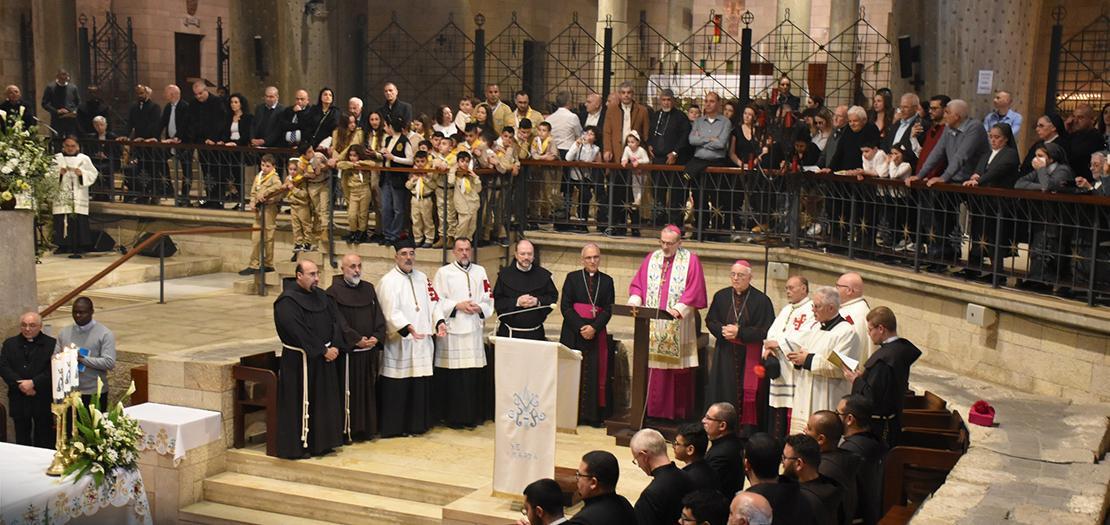
Following is the text of the homily for the Solemnity of the Annunciation by Latin Patriarch of Jerusalem His Beatitude Pierbattista Pizzaballa on March 25, 2023:
Brothers and sisters,
may the Lord give you peace!
As every year, on the occasion of this solemn Eucharistic celebration and the proclamation of the Gospel of the Annunciation, we gather here in the house of the Virgin Mary to contemplate once again the mystery of the Incarnation.
The Gospel passage proclaimed announces a great hope: “Behold, you will conceive in your womb and bear a son, and you shall name him Jesus. He will be great… and of his kingdom there will be no end.” (Luke 1:31-33)
Jesus’ name means “God saves.” According to the angel Gabriel, Jesus will be a Savior, He will be great and His Kingdom over the world will have no end.
This is an important and hopeful statement, and yet it appears far removed from our experience. As it seems hard to believe, when we look at what is happening around us, that Jesus rules over this world of ours, that the world has been saved.
If we look at our reality in the Holy Land, it indeed seems that Christ not only does not reign, but is also mocked and rejected. We have seen this repeatedly in Jerusalem over the past few weeks. We even see it in certain bills which, even though we know they will not be passed, still show an attitude of blatant rejection of the Kingdom of Christ and of Christianity.
But even stepping outside our Christian context, if we widen our gaze to the world at large, we see so many wars and divisions, which continue to intensify – and not only in the Holy Land or in Ukraine.
Moreover, as I have said many times, divisions are not confined to politics. In schools, families and communities, confrontations also seem to be increasingly frequent and widespread. The list of conflicts and tensions in the different areas of life is long. My point in listing them is that while on the one hand we have the angel Gabriel announcing the beginning of a new Kingdom of salvation, on the other hand we see so much desolation around us that we are led to believe that the world is not really saved after all, that the Kingdom of Christ has not really blossomed into people’s lives.
Where is the Kingdom? How can we believe the angel’s words, “and His Kingdom will have no end”? Where is God’s intervention, where do we see His action in the world?
Let’s face it: we no longer believe, or do not believe enough, in the action of God in history, in our lives. The events that we have experienced and that we are experiencing today, whether personal or social, as well as perhaps even a certain theological thinking, speak to us of a God who respects freedom, who “shrinks” to make room for man, who suffers with His creatures, who shares their pain, who walks the paths of love rather than those of power. All this is true, very true. But they risk stopping at one aspect and reducing His love to a mere feeling of closeness, which shares everything but saves nothing.
Today here in Nazareth, however, it is revealed to us that in Jesus, “God saves!” His love, His compassion, His mercy are active, true, strong. Today we are told that His love is not a feeling, but a decision. A decision that opens new paths, intervenes, asks, proposes, creates a way. The Annunciation makes us contemplate the creative and redemptive activity of God. The Gospel passage proclaimed today is not a fantasy, not a deception; it is the proclamation of true life, of a reality that we can still experience today. It is the proclamation of God's love that becomes Flesh and that we can touch, that reaches us to the depths of our solitude, that awaits only our response, free and active.
To God who wants to save, corresponds Mary who wants to become a mother. Perhaps we also forget this. Mary’s obedience is not passivity. We are so used to talking about and contemplating the “yes” of the Virgin that we sometimes think that she merely accepted God’s will, to become in some way the simple executor of it.
Yet she did not. Mary entered into God’s plan and made it her own, sharing it, “marrying” it, as her visit to Elizabeth shows. After the angel’s announcement, she immediately sets out to accomplish what the angel has told her, to participate in God’s plan of salvation, which has now also become hers, and in which she will participate, in her own way and in her own time.
Mary’s “yes”, therefore, should be read not only as her acceptance of God’s plan, but also as a positive will to contribute to the salvation of the world.
Today, it is up to all of us to ask ourselves, how active is our faith? Have we abandoned to others the desire and commitment to change and save the world? Do we not sometimes risk making faith a sentimental companion or, at best, a mere interpretation of reality?
Faith is a force for change. We do not just want to love this world, we want to save it. For a Christian, to love means to save, even at the cost of one’s life. Christians do not lock themselves up in a kind of sophisticated devotional attitude, they are not afraid of divisions, rejections, persecutions. Their faith does not fail because of the presence of evil in the world. On the contrary, they are open to the life of the world, they want to transform it and become active builders of the Kingdom. This is how Christ reigns over the world, according to the words of the angel: through the passion and love of the believers, through the Church that, in spite of everything, is still today the one who continues to announce and offer salvation to mankind.
This mission is first and foremost ours, that of the Church of the Holy Land, the Mother Church. Let us not lose ourselves in the analysis of the dramatic situation we are experiencing. We know that difficult times lie ahead, but let us not be afraid. No one can separate us from the love of Christ (cf. Rom 8:35), no one can extinguish our desire to change and save the world, no one can rob us of the dream of another way of life, no one can stifle in us the certainty of the salvation that has come to us and that is stronger than any opposite reality.
Today, we too, the Church of the Holy Land, have come here to Nazareth, to the house of the Virgin Mary, to reaffirm our “yes” to God’s plan of salvation for this Land, and to reaffirm our commitment to that change and salvation, knowing that, as the angel Gabriel told Mary, “nothing is impossible to God” (Luke 1:37).


